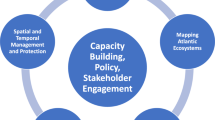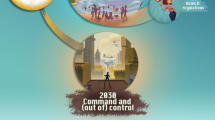Abstract
Following the release of the report From Monsoons to Microbes by the National Research Council in 1999, efforts began to promote federal sponsorship of research and education in a new scientific discipline focusing on how the ocean affects human health. The National Institute of Environmental Health Sciences (NIEHS) and the National Science Foundation (NSF) initiated a joint program to establish and sustain several research Centers for Oceans and Human Health (COHH) at nonfederal institutions. Shortly thereafter, the National Oceanic and Atmospheric Administration (NOAA) mounted a similar initiative to establish intramural centers at existing NOAA facilities as well as an extramural grants program. This profile reviews the history and current state of these developments.
Similar content being viewed by others
References
DA Anderson (1995) ECOHAB: The Ecology and Oceanography of Harmful Algal Blooms: A National Research Agenda Woods Hole Oceanographic Institution Woods Hole, MA
DG Baden (2002) ArticleTitleHarmful algal blooms (HAB) toxicity (abstr) Epidemiology 13 (Suppl) S126
Baden DG, Fenical W, Fuhrman J (2001) Oceans and Human Health: Roundtable Report, 17–18 December, 2001, Research Triangle Park, NC: National Institute of Environmental Health Sciences. Available: http://www.niehs.nih.gov/translat/pubs.htm [accessed March 25, 2004]
InstitutionalAuthorNameBermuda Biological Station for Research (BBSR) (2000) ArticleTitleBBSR capitol briefing focuses on ocean and human health Currents Fall 3
RR Colwell (1996) ArticleTitleGlobal climate in infectious disease: the cholera paradigm Science 274 2025–2031
Committee on Environment and Natural Resources (CENR) (2000) National Assessment of Harmful Algal Blooms in US Waters. National Science and Technology Council Committee on Environment and Natural Resources, Washington, DC: National Oceanic and Atmospheric Administration
P Epstein B Sherman E Spranger-Siegfried A Langston S Prasad B McKay (1998) Marine Ecosystems: Emerging Diseases as Indicators of Change Harvard Medical School Boston:
W Fenical (2002) ArticleTitleMarine pharmaceutical discovery (abstr) Epidemiology 13 (Suppl) S126
JA Fuhrman RT Noble (2002) ArticleTitleBacterial and viral vectors of water-borne disease: suggesting new applications for studying an age-old problem (abstr) Epidemiology 13 (Suppl) S126
Intergovernmental Oceanographic Commission (IOC) (2003) The Integrated Strategic Design Plan for the Coastal Ocean Observations Module of the Global Ocean Observing System. IOC/INF Report 1183. Paris: UNESCO
A Knap É Dewailly C Furgal J Galvin D Baden RE Bowen et al. (2002) ArticleTitleIndicators of ocean health and human health: developing a research and monitoring framework Environmental Health Perspectives 110 839–845
National Institute of Environmental Health Sciences (NIEHS) (2002a) Centers for Oceans and Human Health (RFA ES-03-003), NIEHS, Research Triangle Park, NC
National Institute of Environmental Health Sciences (NIEHS) (2002b) NIEHS Strategic Plan 2000, NIEHS, Research Triangle Park, NC
National Ocean Partnership Program (NOPP) (1999) Toward a U.S. Plan for an Integrated Sustained Ocean Observing System. Washington, DC: National Ocean Partnership. Available: http://www.coreocean.org
National Research Council (NRC) (1992) Oceanography in the Next Decade: Building New Partnerships, Washington, DC, National Academy Press
National Research Council (NRC) (1999) From Monsoons to Microbes, Washington, DC, National Academy Press
National Research Council (NRC) (2001) Under the Weather: Climate, Ecosystems, and Infectious Disease, Washington, DC, National Academy Press
National Science Foundation (NSF) (2000) NSF Geosciences Beyond 2000: Understanding and Predicting Earth’s Environment and Habitability, Arlington, VA, National Science Foundation
National Science Foundation (NSF) (2001) Ocean Sciences at the New Millennium, Arlington, VA, National Science Foundation
S Pfirman InstitutionalAuthorNameAdvisory Council for Environmental Research and Education (AC-ERE) (2003) Complex Environmental Systems: Synthesis for Earth, Life, and Society in the 21st Century National Science Foundation Arlington, VA
United States House of Representatives (2000) Departments of Veterans Affairs and Housing and Urban Development, and Independent Agencies Appropriations Bill, 2001. House Report 106-674, Washington, DC: United States Congress
U.S. Commission on Ocean Policy (2002) Developing a National Ocean Policy: Midterm Report of the U.S. Commission on Ocean Policy, Washington, DC. Available: http://www.oceancommission.gov
JE Vena (2002) ArticleTitleThe challenge to environmental epidemiology from the ocean’s role in human health (abstr) Epidemiology 13 (Suppl) S126
JD Watkins A Huq (2001) The relationship between oceans and human health CE Koop CE Pearson MP Schwartz (Eds) Critical Issues in Global Health Jossey-Bass Publications San Francisco 356–363
Acknowledgments
We thank the many members of the research community who provided advice and donated time to the agencies during the early stages of developing the COHH initiative, especially Daniel Baden, William Fenical, Jed Fuhrman, and John Vena. We also acknowledge the dedicated efforts of our intramural colleagues, especially H. Lawrence Clark, Peter Milne, Liam O’Fallon, Frederick Tyson, and William Wiseman.
Author information
Authors and Affiliations
Corresponding author
Additional information
The statements and opinions in this report are those of the authors only and do not necessarily represent the position of, or imply commitments by, any agency of the United States Government.
Rights and permissions
About this article
Cite this article
Rice, D.L., Dearry, A. & Garrison, D.L. Pioneering Interdisciplinary Research Initiatives for Oceans and Human Health . EcoHealth 1, 220–225 (2004). https://doi.org/10.1007/s10393-004-0126-2
Published:
Issue Date:
DOI: https://doi.org/10.1007/s10393-004-0126-2




